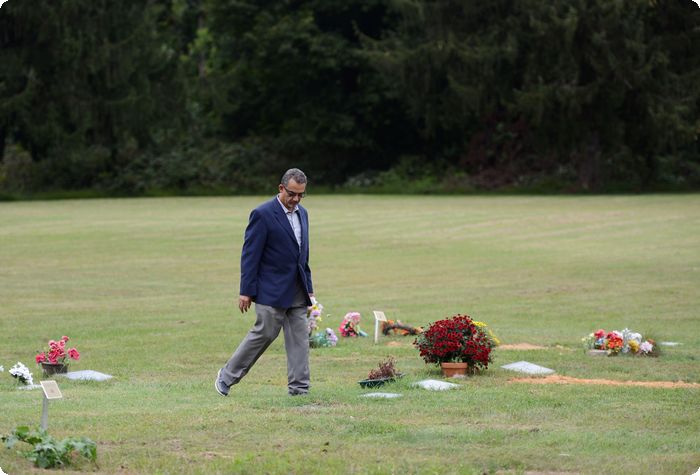By Susan Shelly

Most people know little about the religious practices of those of other faiths.
Lacking interest, opportunity or sometimes both, we miss out on the significance and beauty of the rituals and ceremonies others use to acknowledge birth, coming of age, marriage, the process of aging and death.Muslims, of which there are about 250 families living in Berks County, have certain beliefs and observe certain practices when a member of their community dies.
Iman Anwar Muhaimin, who travels from Philadelphia to lead prayers at the Islamic Center of Reading each Friday afternoon, along with Elsayad “Steve” Elmarzouky, a Berks County Muslim leader, shared some information about Muslim funeral practices and beliefs regarding death and the afterlife.Understanding that, as with most religions, customs will vary depending on cultural differences, they described what typically occurs after the death of a faithful Muslim.
Preparing a body for burial
When an observant Muslim dies, the body normally is taken to a funeral home to be washed and prepared for burial. Locally, Elmarzouky said, bodies are taken to one of the locations of Bean Funeral Home and Crematory.
Family members or members of the mosque who are trained in the ritual washing of the dead perform that task. Men wash men, and women wash women.Muslims do not cremate the deceased, Muhaimin explained, because they believe that the body should be returned to God in the same state in which it was given.”God gives me the body, so I need to give it back to him,” Muhaimin said. “The idea is that the body is God’s gift to you, so you should give it back to God.”If cremation is necessary due to financial or other circumstances, however, it is permissible.”When we have to do something out of necessity, God understands,” Muhaimin said.
The burial of a Muslim
Once the body is prepared for burial, it is taken in a simple casket to the mosque, where believers can pray over it. A special prayer, called Salatul Janazah, is performed, and the body is taken to the cemetery for burial.
Muslims normally are buried with other Muslims. In Berks County they do not have a cemetery designated exclusively to members of their faith, but use a designated section of Laureldale Cemetery.In cemeteries where caskets are not required for burial, a faithful Muslim would be buried in a simple, white wrapping, Muhaimin explained.”We want to be as close to the way we came into the world as possible,” he said.Believers are called to put the body of a loved one in the ground with their own hands, so shovels often are available at the cemetery.Before the body is placed in the ground there are more prayers, mostly supplications on behalf of the deceased, Elmarzouky explained.”We ask God to forgive sins and grant a happy afterlife,” he said.When the body is placed in the ground, it is positioned so the face is looking to the East, the same direction in which Muslims face while reciting daily prayers.Usually, a Muslim is buried on the same day as the death occurs, or at least within 24 hours of the death.That practice, explained Muhaimin, is so the soul, which has been released from the body, is not looking back.”Once the soul leaves, we no longer have the right to hold it back,” Muhaimin said.
Muslim belief in an afterlife
The span of human life is part of the journey of the soul, Muhaimin said, but not the soul’s home.
“The soul is just passing through when it’s on Earth,” he said. “The purpose of earthly life is to gain enlightenment. It is not the end.”Muslims believe in heaven and hell, and where a person will reside depends on several things, Elmarzouky explained.To arrive in heaven, the deceased must have performed good deeds while alive. His or her relationship with humanity will be examined. And, the fate of the deceased lies largely with the mercy of God.Like many Christians, Muslims believe there will be a day of judgment, during which the righteous are raised up to be with God and the wicked sent to hell.A person who has lived a godly life will be rewarded with heaven, Muhaimin said.”Believers and righteous people who have lived in spiritual covenant with God will be in heaven,” he assured.
Complete Article HERE!
